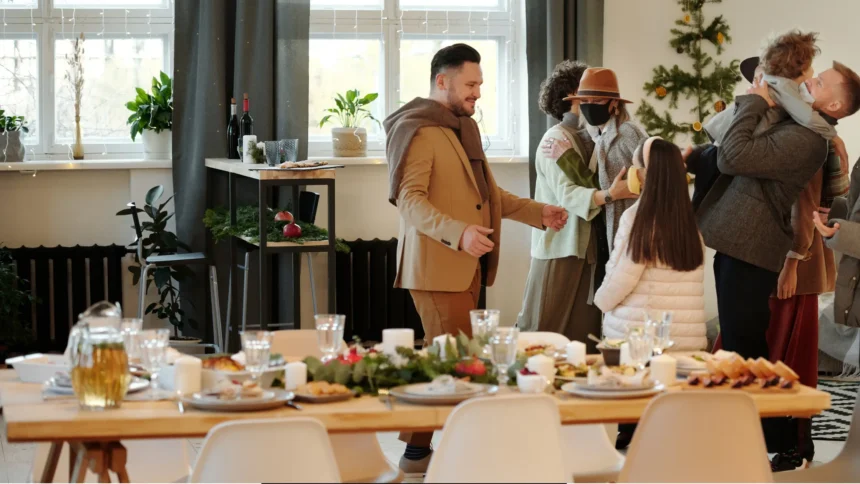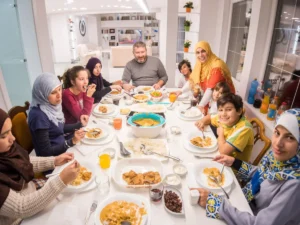In Turkish society, Randavü is not simply regarded as a casual encounter but rather as a special ritual in which different parties come together. The term “Randavü” is used for casual and formal meetings, regardless of whether it’s a child’s birthday, a presentation, or a family reunion over tea. This tradition has always belonged to Turkish history and embodies elements of society, hospitality, and belonging.
Randavü has always existed from the Ottoman Empire period up to the current era of Turkish society as a means of enhancing relations among people as well as their experience and building lasting relationships. It is hard to imagine working and living in a Turkish society today without the concept of Randavü; it remains a fundamental aspect of the life of Turkish people, reminding people of the importance of personal interactions and genuine conversations.
This article aims to understand Randavü, its history and cultural importance, and its relevance in modern society today. We will also describe the practice, including its variants, rules, and how it works today in Turkey. This guide will provide you with an understanding of how Randavü has changed perception and shaped society for the better, regardless of how much of the Turkish culture you know or are curious about.
What is Randavü? An Overview of the Tradition
It is a term that goes a long way in Turkish culture. The term “Randavü” refers to a meeting or gathering of some people where they meet with each other, build relationships, and enjoy each other’s company. This practice is common in Turkish society and has existed for many centuries. It’s not simply about interacting with individuals but more about interacting in a more productive way.
Randavü can happen both formally and informally. For instance, there can be an official business meeting for those who want to do business planning. On the contrary, it may also be simply meeting up with friends or relatives for a cup of tea or dinner. The main idea is to ensure that there is time for interaction and communication to enhance social interactions.
Turkish culture encompasses aspects such as respect, hospitality, and community. The essence of Randavü, which brings everyone together, whether the occasion, be it a business, family, or friendly meeting, is to exchange experiences, hear each other, and build relations. Even today, in Turkey, this tradition lives on and adheres to social interactions in various ways.
The Historical Roots of Randavü in Turkish Culture
Randavü has always been important in Turkish culture, and its origins can even be traced back to the Ottoman Empire. Back in those days, such occasions were a part of daily life. The Ottomans gave much importance to a person’s physical presence. They thought that sitting down with each other for food, tea, or just for communication strengthened bonds.
In the Ottoman Empire, such gatherings were not only for entertainment. They were useful for exchanging knowledge, doing business, or reinforcing communities. People would meet in coffee shops, markets, and other sites to discuss different issues and share ideas and help. These interactions of Randavü, where purposefulness of the conversation, together with respect and hospitality, came as the key features. It was not only about the simple meeting but much more important was the quality time spent together.
With the passage of time, the form of Randavü changed, but the basic rules remained nearly intact. Despite modernity and changes in society, the concept of Randavü, a place for people, functions, and relations that remained with meaning and relations, still prevailed. This custom was also handed over from generation to generation, transforming the modes of socialization among Turkish people.
Cultural Significance of Randavü in Turkey
Randavü is not just a social meeting; it embodies fundamental aspects of the Turkish culture, such as hospitality and respect towards each other and to the whole society. As for the family members, Rangavoo helps them sustain strong relationships. Regular meetings at meals or tea allow help each other and share experiences and encourage these practices among the young.
In professional environments, Randavü is crucial in forming a professional network. Formal meetings always start with a tea of coffee and casual conversation to build trust before the formal discussion. This practice shows the importance of Turks in personal relations and business interactions.
Randavü ‘s reach also extends into the local areas. Whether festive or not, these socializations provide platforms for people to interact since they want to be a part of something bigger than themselves. Such interactions display the overwhelming showering of the visitors with ample food, drinks, and engaging conversations.
In sum, Randavü has been and is still important in the social and cultural aspects of embracing Turkish hospitality.
The Modern Practice of Randavü in the Contemporary World
In the present situation, no matter how time-constrained a person may be, the culture of Randavü has improved with time without losing focus on the importance of connection as well as hospitality. Even modern-day Turkey puts a great deal of emphasis on the social interactions, often in the form of face-to-face communication in cafes, houses, or workplaces, etc.
However, with the advancement of digital technology, Randavü has survived in different ways. Virtual gatherings on video calls and social media have become the new forms of Randavü, allowing people to start connecting. Nonetheless, many Turks still avoid such practices and accept in-person meetings and discussions because they feel that all telecommunication systems lack the warmth and personal contact that is needed and highly appreciated.
Young people living in this ever-moving world of technology still hold on to Randavü. They still manage to mix traditional values with modern practices and find time for a get-together within their busy lives. Whether meeting up with friends at a modern restaurant or having a family dinner at home, the essence of Randavü is alive and well, as it has proven to be adaptive in modern times.
Formal vs. Informal Randavü: Understanding Different Social Encounters
Randavü may take many forms, including formal and informal ones. Every type has its place in Turkish society because people need to bond and relate with one another.
Formal Randavü is often carried out in organizations dominated by business interactions like meetings. In such get-togethers, intention is the most important thing. People attending are expected to arrive on time, pay attention to the agenda, and communicate respectfully. For instance, a work-related conference featuring a business meeting usually begins with light conversations over tea/coffee to set the mood before the proceedings. That is the Turkish way of both hospitality and business mannerism.
Informal Randavü, on the other hand, is rather less serious than the guidelines described above. It involves visiting friends and family for meals or visiting community activities. Such encounters are usually spontaneous and less structured. Here, the focus shifts to having fun, making memories, and connecting with people. In spite of being informal, usually, those in charge will do their best to ensure the guests are satisfied by providing meals and snacks, drinks as well as long friendly talks.
Understanding the differences between formal and informal Randavü, one can see why this practice is quite adaptable. In both cases, the values are the same: forming true links, welcoming people, and creating relations.
How to Host a Successful Randavü: Etiquette and Best Practices
The main idea in hosting a Randavü of whichever category is to ensure that the guests feel comfortable and appreciated. Turkish culture is very hospitable, and therefore, the host has to pay attention to every little aspect. Here are some tips to help you host a successful Randavü:
1. Set the Right Atmosphere
It is impossible to do without creating an enabling environment; the same applies to the Randavü. In the case of an informal gathering, this may entail having a corner in one’s house with enough seats and soft lighting. In the case of formal meetings, the room must be tidy, well-arranged, and inviting. Even small items such as flowers or tea can have an immense impact.
2. Offer Food and Drinks
When it comes to Randavü, food has a special meaning to it. Expecting tea and coffee along with snacks is a compliment to Turkish civilization. If it is a casual meeting, you can consider serving some traditional Turkish food or sweets to make the event special. Typically, some food is offered before a formal meeting starts, for example, tea or coffee, which prepares the atmosphere for the meeting and lessens the seriousness of starting such a meeting.
3. Practice Good Timing
Timing is especially important when it comes to formal Randavü. Arriving on time shows concern and respect for others. There is a bit more regularity for informal gatherings, but still, it is advisable to avoid disturbing other people’s schedules. As a host, you should be able to coordinate people in the right direction without hurrying everyone up.
4. Engage in Meaningful Conversation
Randavü is not only a business but also a social affair, so ensure your guests actively participate in interesting talks. Make sure to ask questions and allow the clients to respond to them. Don’t initiate business conversations right away. For instance, during the first few minutes of a meeting, focus on talking about other subjects that are not work-related in order to enhance the level of trust amongst others.
5. Show Gratitude
In the end, thank all the people who came for a meal, regardless of the occasion. Be it a family dinner or a business gathering, always try to say “thank you” to all guests for coming.
By following these best practices, you can ensure that your Randavü is not simply a meeting but a pleasant event for all concerned.
The Future of Randavü: Keeping up the Custom of Randavü in Modern Times
In this modern age, where everything happens rapidly, it has been a struggle to devote time to the culture of Randavü. However, this remains a tradition embedded in even modern-day Turkey. As lifestyles and culture change, more and more technologies are incorporated into Randavü, but the main focuses of hospitality, honor, and togetherness have not wavered.
The digital transition is one of the most important transformations of the perception or practice of Randavü. Phone calls, video calls, and social media have become the order of the day where Randavü is concerned, particularly where a physical meeting is unlikely. Such gatherings do not have the same degree of warmth and depth as physical ones, but they do sustain and promote the spirit of Randavü. These new methods of keeping in touch have been readily adopted by the Turks, and thus, the tradition has not died out even in a digital era.
The younger generation also tends to combine both the modern and traditional forms of Randavü. For instance, in Turkey, many young individuals manage to balance modern life and its demands with family schedules by attending family meal times, enjoying a conversation at a friend’s house or at a café, or resorting to electronic means. This flexibility indicates why Randavü would still survive and flourish, providing wholesome engagement even with modernity’s distractions.
Randavü has bright future prospects because it integrates every person’s basic, fundamental needs—the need for communication, hospitality, and interaction. Until people value these needs, Randavü will not die in Turkey but rather change to adapt to the needs of the time.
Why Embracing Randavü is Essential for Stronger Social Connections
It is also worth noting that the practice of it involve more than just sharing culture; they also serve to build strong social relationships among individuals. With the world becoming faster and more digitalized, time has never been harder to find than in having relations with other people.
With the help of professional or social venues, people can enhance their interaction with others. Especially in business relationships, it stimulates trust and respect, which are essential in relationships. It becomes easier to keep in touch with the immediate family and friends within a person’s various relations, offering proper support and attachment.
Treating a guest with importance and ease draws people to one another on a deeper level. This eventually brings about listening and talking without inactive minds, both of which are crucial for friendships.
Even outside of Turkey, the principles of this tradition can be applied globally. It allows us to enhance our social and professional interactions by ensuring there is enough time and room for personal interactions, which add more value to life and work.
Conclusion
Randavü: traditional customs that have survived the centuries. Beginning from a very historical context, as was the Ottoman Empire in Turkey, and continuing up to this time, where Turkey practices some aspects, the experience is appealing to relations creation and maintenance.
In this article, we have examined Randavü’s past perception, cultural relevance, and current practice. We have also differentiated formal meetings from informal ones, presented pointers on making Randavü more successful, and explained why this custom is significant even in modern digital society.
This means that by appreciating it in the workplace or in our personal relationships, we will enhance the social bonds that exist within and across individual societies. It is a reminder that even with all the advancements in technology, people will always need one-on-one, face-to-face interaction.
If you find the exploration interesting, please try to implement its principles in practice as well. Organize meetings, contact people, and see how wonderful this tradition is.
Frequently Asked Questions
Q1: What does Randavü mean?
A: : Randavü is a Turkish word defined as an gathering of people, whether for any purpose or just to have fun. It is firmly established in Turkish traditions and culture and is more than just a gathering. Randavü is about engagement, warmth, and the building of networks.
Q2: How is Randavü practiced in modern Turkish society?
A: In contemporary Turkey, it is used in traditional and modern forms. In the past, when physical meetings were still loved and preferred, the rapid growth of technology has also brought about remote Randavü, where people meet using video calls or social media. Regardless of these adjustments, interactions and friendly gestures remain central.
Q3: Why is Randavü important in Turkish culture?
A: This is important since it embodies the Turkish culture of being welcome. It creates an environment where families bond, business networks can be strengthened, and social networks can be developed.
Q4: How can one host a successful Randavü?
A: To ensure success, you should establish a friendly environment, provide food and Turkish tea or coffee, participate in relevant conversations, and thank your visitors. For formal events, prepare a list of topics and remember the rule of time, while for informal ones, prepare a list of topics and remember the rule of time.








